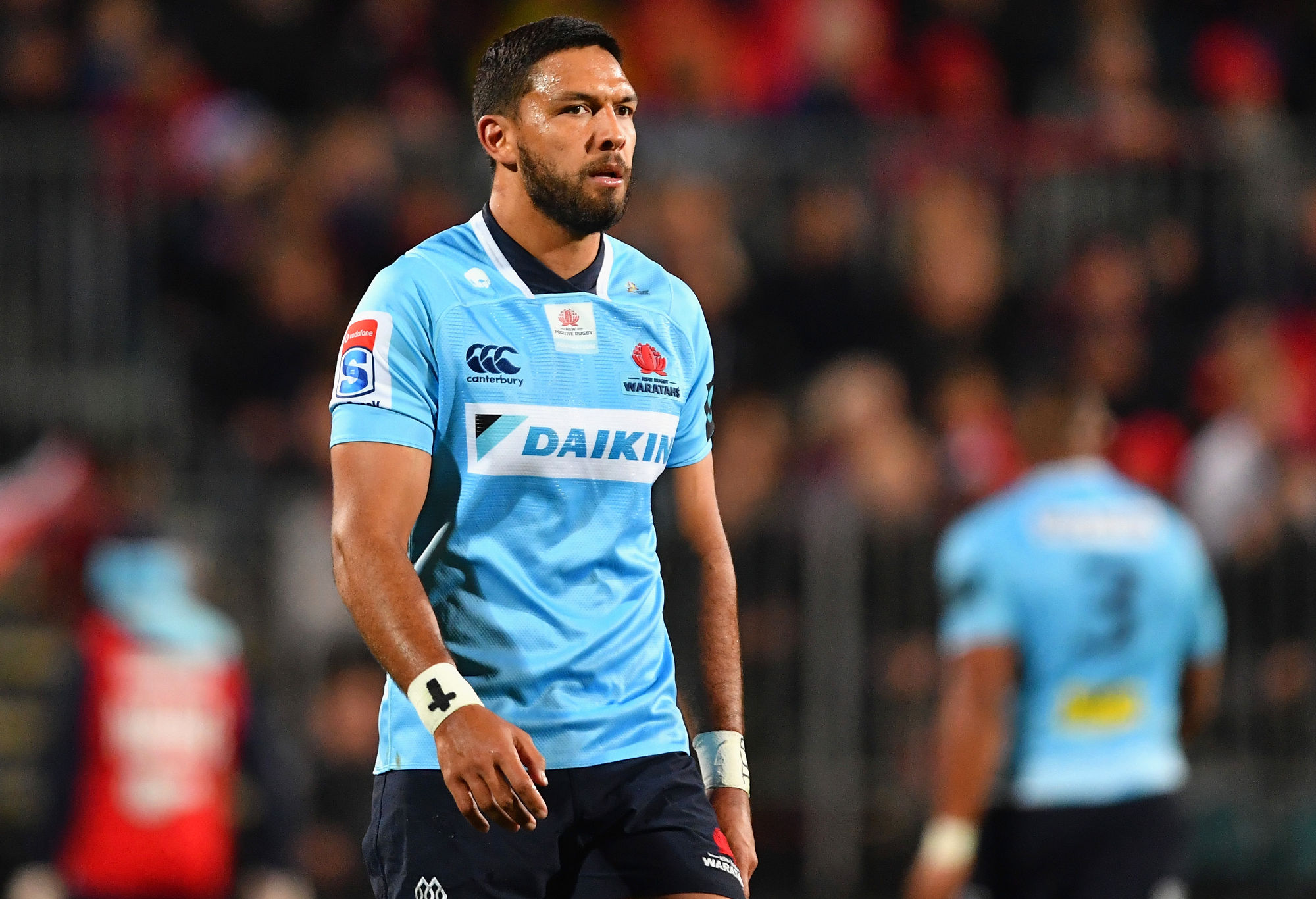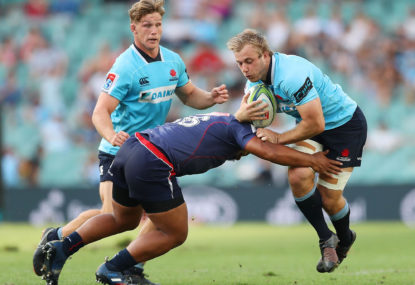Two articles were published today calling for the abolishment of Super Rugby as we know it.
Paul Cully in SMH advocates for Australia to go it alone and establish a domestic competition. While David Lord called for a revamped multi-nation competition here on The Roar, focused on the Pacific with no South Africa.
What these proposals suggest and most fans seem to agree, is that Super Rugby is quickly losing relevance. The biggest problem though, is these two suggested solutions are very Australia centred, ignoring the strong health of the game outside our shores and not fixing the problems vexing the local game.

Curtis Rona (Photo by Kai Schwoerer/Getty Images)
The major issues with the competition as it stands are the unequal and confusing draw, unappealing kick off/broadcast times and the wide gap in quality between sides. From a fan’s point of view this equates to games they cannot watch live, predictable results and teams not being rewarded fairly with finals appearances.
Any revamped competition has to offer practical solutions to these problems, including the commercial realities and approval of the national unions. As an Australian supporter, the alarming deterioration in franchise performance and exodus of top players compound these problems, but that is a topic for another article.
A solely Australian competition would struggle at the moment as there isn’t the financial or consumer market to sustain such a competition and the player drain to Europe would be hastened.
It would need at least eight teams, so this would muddy the waters when it comes to territorial divides and state based teams.
For example, what would become of the ‘NSW’ Waratahs and ‘Queensland’ Reds. Would they be dissolved in favour of the NRC franchises or be part of the new competition, but no longer represent the entire State?
The manufactured franchises and amalgamation of Sydney clubs in the NRC hasn’t generated much support and it also sacrifices historical supporter allegiances and rivalries. However, one enticing prospect in this model could be a return of true NSW versus Queensland State of Origin-type matches as matches outside of a franchise based competition.
Dropping South Africa may have some merit when it comes to a provincial competition, but removing them from the Rugby Championship would be a big mistake. The tradition and rivalry between the Springboks, Wallabies and All Blacks to too valuable to sacrifice and the All Blacks especially would not want to go without regular matches with their traditionally strongest opponent.
The other proposal of forcing players to return to their country of origin is too restrictive and removes player freedoms. It would also be extremely costly to remunerate these players; who would pay for it?

Courtnall Skosan of South Africa (Photo by Anthony Au-Yeung/Getty Images)
A practical solution would be a Pacific-based provincial competition from Feb-June, followed by inbound tests against the Northern Hemisphere nations and a two tiered Pacific Nation Test competition.
The provincial competition would comprise of teams from Australia, New Zealand, Japan, and the Pacific with the potential to expand into Asia.
I would not include Argentina in this competition. Instead a separate Americas provincial competition could be set up with teams from North and South America. To level the playing field, New Zealand should expand their number of teams to six or seven with five from Australia, one from Japan and 1-2 from the Pacific and options to add further Asian teams down the track maxing out at 18 teams.
A simple format of playing every team once per season, at home one year, away the next, with the top ranking teams qualifying for finals (this could be six or eight teams depending on the total number of teams).
I would also allow any player in the competition to be eligible for their national side regardless of which club they play for. That is, an Australian player would be eligible for the Wallabies even if they play in New Zealand or Japan or the Pacific Islands. South African provinces are then free to join Europe.
When it comes to Test matches, there would be time for three matches against the touring Northern Sides, either a series or individual matches. This would be followed by a revamped Rugby Championship absorbing the Pacific Nations competition.
I propose a promotion/relegation competition involving New Zealand, South Africa, Australia, Argentina, Fiji, Tonga, Samoa, Japan, USA and Canada.
The top five teams play a competition playing each other once per year as they do in the six nations. The bottom five teams play an equivalent.
The bottom ranking team from tier one gets relegated, the top tier two team prompted. The Bledisloe cup would continue as a three match series, ideally incorporating one Rugby Championship fixture, with the other two book-ending the main competition (so long as Australia doesn’t get relegated! Then they would need to fit in an extra match).
This leaves time for a 4-5 match Northern tour to conclude the calendar year. This works out at 10-14 Tests per year.
While this proposal sacrifices the South African provinces to Europe, the potential for a more even competition, strengthening traditional markets, and importantly in similar time zones would have more commercial and consumer appeal while providing potential growth into new markets, especially Asia.
The competition could have potential for broadcast revenue from Europe and South Africa for further funding. The Test competition retains traditional rivalries but adds relevance and opportunities for developing Test nations.
This format is practical and achievable although does require some sacrifices and change to the status quo, particularly from New Zealand, who have the most to lose. But importantly it would offer accessible and exciting rugby.































































































